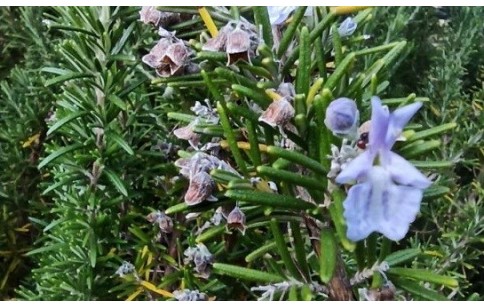- Code : #5421 S 100 mg
- Formula : C₁₀H₁₈O
- CAS : 464-43-7
Rosmarinus officinalis
Rosmarinus officinalis, “Rosemary” in English and “Romarin” in French, belongs to the Lamiaceae botanical family. It is a woody shrub that can reach a height of 1,50 m.
Native to the Mediterranean region, it grows in rocky and dry places, especially near the sea.
The fragrant needle-like leaves are used as a spice for cuisine and liquors. The drug is employed as a preservative and antioxidant, for example for meat and fat.
It is used medicinally as a carminative and stomachic in digestive upsets, flatulence etc, but also to stimulate the appetite and gastric secretion. As an ointment, it is an analgesic liniment for rheumatism. In folk medicine, it is put on dressings for poorly healing wounds and eczema. It is used as an insecticide.
The main components of its leaves’ essential oil (1 to 2.5%) are 1,8-ciineole, camphor, a-pinene and other monoterpenes; rosmarinic acid, diterpenoid bitter substances, triterpene acids, triterpene alcohols and flavonoids.

- Code : #5006 S 100 mg
- Formula : C₁₀H₁₈O
- CAS : 464-45-9
- Code : #5007 S 100 mg
- Formula : C₁₂H₂₀O₂
- CAS : 5655-61-8
- Code : #6034 S 20 mg
- Formula : C₉H₈O₄
- CAS : 331-39-5
- Code : #5485 S 100 mg
- Formula : C₁₀H₁₆
- CAS : 79-92-5
- Code : #5455 S 1 g
- Formula : C₁₀H₁₆O
- CAS : 76-22-2
- Code : #3723 10 mg
- Formula : C₂₀H₂₈O₄
- CAS : 3650-09-7
- Code : #3735 10 mg
- Formula : C₂₀H₂₆O₄
- CAS : 5957-80-2
- Code : #5020 S 100 mg
- Formula : C₁₀H₁₄
- CAS : 99-87-6
- Code : #5009 S 100 mg
- Formula : C₁₀H₁₈O
- CAS : 470-82-6
- Code : #5082 S 100 mg
- Formula : C₁₀H₁₆
- CAS : 5989-27-5
- Code : #1125 S 20 mg
- Formula : C₁₅H₁₀O₆
- CAS : 491-70-3
- Code : #5124 100 mg
- Formula : C₁₀H₁₆
- CAS : 123-35-3
- Code : #5382 S 100 mg
- Formula : C₁₀H₁₆
- CAS : 7785-70-8
- Code : #5441 S 100 mg
- Formula : C₁₀H₁₆
- CAS : 18172-67-3
- Code : #4957 S 20 mg
- Formula : C₁₈H₁₆O₈
- CAS : 20283-92-5

















